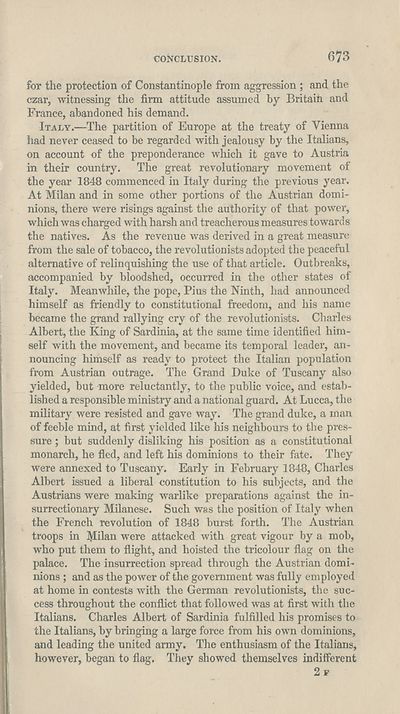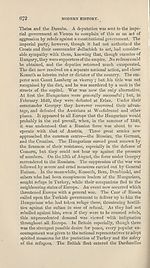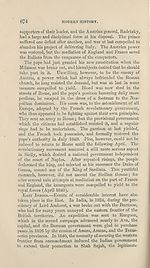Download files
Complete book:
Individual page:
Thumbnail gallery: Grid view | List view

CONCLUSION.
673
for the protection of Constantinople from aggression; and the
czar, witnessing the firm attitude assumed by Britaifi and
France, abandoned his demand.
Italy.—The partition of Europe at the treaty of Vienna
had never ceased to be regarded with jealousy by the Italians,
on account of the preponderance which it gave to Austria
in their country. The great revolutionary movement of
the year 1848 commenced in Italy during the previous year.
At Milan and in some other portions of the Austrian domi¬
nions, there were risings against the authority of that power,
which was charged with harsh and treacherous measures towards
the natives. As the revenue was derived in a great measure
from the sale of tobacco, the revolutionists adopted the peaceful
alternative of relinquishing the use of that article. Outbreaks,
accompanied by bloodshed, occurred in the other states of
Italy. Meanwhile, the pope, Pius the Ninth, had announced
himself as friendly to constitutional freedom, and his name
became the grand rallying cry of the revolutionists. Charles
Albert, the King of Sardinia, at the same time identified him¬
self with the movement, and became its temporal leader, an¬
nouncing himself as ready to protect the Italian population
from Austrian outrage. The Grand Duke of Tuscany also
yielded, but more reluctantly, to the public voice, and estab¬
lished a responsible ministry and a national guard. At Lucca, the
military were resisted and gave way. The grand duke, a man
of feeble mind, at first yielded like his neighbours to the pres¬
sure ; but suddenly disliking his position as a constitutional
monarch, he fled, and left his dominions to their fate. They
were annexed to Tuscany. Early in February 1848, Charles
Albert issued a liberal constitution to his subjects, and the
Austrians were making warlike preparations against the in¬
surrectionary Milanese. Such was the position of Italy when
the French revolution of 1848 burst forth. The Austrian
troops in Milan were attacked with great vigour by a mob,
who put them to flight, and hoisted the tricolour flag on the
palace. The insurrection spread through the Austrian domi¬
nions ; and as the power of the government was fully employed
at home in contests with the German revolutionists, the suc¬
cess throughout the conflict that followed was at first with the
Italians. Charles Albert of Sardinia fulfilled his promises to
the Italians, by bringing a large force from his own dominions,
and leading the united army. The enthusiasm of the Italians,
however, began to flag. They showed themselves indifferent
673
for the protection of Constantinople from aggression; and the
czar, witnessing the firm attitude assumed by Britaifi and
France, abandoned his demand.
Italy.—The partition of Europe at the treaty of Vienna
had never ceased to be regarded with jealousy by the Italians,
on account of the preponderance which it gave to Austria
in their country. The great revolutionary movement of
the year 1848 commenced in Italy during the previous year.
At Milan and in some other portions of the Austrian domi¬
nions, there were risings against the authority of that power,
which was charged with harsh and treacherous measures towards
the natives. As the revenue was derived in a great measure
from the sale of tobacco, the revolutionists adopted the peaceful
alternative of relinquishing the use of that article. Outbreaks,
accompanied by bloodshed, occurred in the other states of
Italy. Meanwhile, the pope, Pius the Ninth, had announced
himself as friendly to constitutional freedom, and his name
became the grand rallying cry of the revolutionists. Charles
Albert, the King of Sardinia, at the same time identified him¬
self with the movement, and became its temporal leader, an¬
nouncing himself as ready to protect the Italian population
from Austrian outrage. The Grand Duke of Tuscany also
yielded, but more reluctantly, to the public voice, and estab¬
lished a responsible ministry and a national guard. At Lucca, the
military were resisted and gave way. The grand duke, a man
of feeble mind, at first yielded like his neighbours to the pres¬
sure ; but suddenly disliking his position as a constitutional
monarch, he fled, and left his dominions to their fate. They
were annexed to Tuscany. Early in February 1848, Charles
Albert issued a liberal constitution to his subjects, and the
Austrians were making warlike preparations against the in¬
surrectionary Milanese. Such was the position of Italy when
the French revolution of 1848 burst forth. The Austrian
troops in Milan were attacked with great vigour by a mob,
who put them to flight, and hoisted the tricolour flag on the
palace. The insurrection spread through the Austrian domi¬
nions ; and as the power of the government was fully employed
at home in contests with the German revolutionists, the suc¬
cess throughout the conflict that followed was at first with the
Italians. Charles Albert of Sardinia fulfilled his promises to
the Italians, by bringing a large force from his own dominions,
and leading the united army. The enthusiasm of the Italians,
however, began to flag. They showed themselves indifferent
Set display mode to:
![]() Universal Viewer |
Universal Viewer | ![]() Mirador |
Large image | Transcription
Mirador |
Large image | Transcription
| Antiquarian books of Scotland > Education > Elements of universal history on a new and systematic plan > (693) |
|---|
| Permanent URL | https://digital.nls.uk/127588456 |
|---|
| Description | Thousands of printed books from the Antiquarian Books of Scotland collection which dates from 1641 to the 1980s. The collection consists of 14,800 books which were published in Scotland or have a Scottish connection, e.g. through the author, printer or owner. Subjects covered include sport, education, diseases, adventure, occupations, Jacobites, politics and religion. Among the 29 languages represented are English, Gaelic, Italian, French, Russian and Swedish. |
|---|

